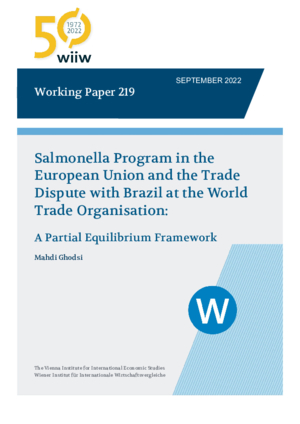Salmonella Program in the European Union and the Trade Dispute with Brazil at the World Trade Organisation: A Partial Equilibrium Framework
wiiw Working Paper No. 219, September 2022
49 pages including 4 Tables and 10 Figures
This contribution provides a cost-benefit analysis in a partial equilibrium framework to investigate the welfare consequences of a prohibitive regulatory non-tariff measure (NTM) in the form of a sanitary and phytosanitary (SPS) measure aimed at a foreign product with perceived negative characteristics. Two groups of consumers are distinguished: one that is indifferent to the foreign product’s negative attributes, and another that is concerned about them. Different scenarios concerning the welfare gains from the introduction of an NTM are explored. The results depend on consumer awareness and information policies pursued by the government of the importing country or group of countries. The theoretical model is illustrated with data on the production and importation of prepared poultry in the EU. This paper focusses on the recent Dispute Settlement (DS) case 607 at the World Trade Organization (WTO) that was initiated by Brazil in November 2021 to consult with the EU on restrictive measures imposed on the importation of prepared and preserved poultry. These restrictions are in line with the comprehensive and restrictive programme legislated by the EU to combat salmonella spp. The findings suggest that the consumer surplus may be reduced after the imposition of prohibitive SPS measures because the market structure changes from a duopoly to a monopoly. However, when the perceived harm of the bad product increases and the portion of the concerned population in society regarding the bad product increases, the change in the consumer surplus also increases.
Keywords: welfare, trade policy, non-tariff measures, technical barriers to trade, dispute settlement
JEL classification: D61, F13
Countries covered: Brazil, European Union
Research Areas: International Trade, Competitiveness and FDI
